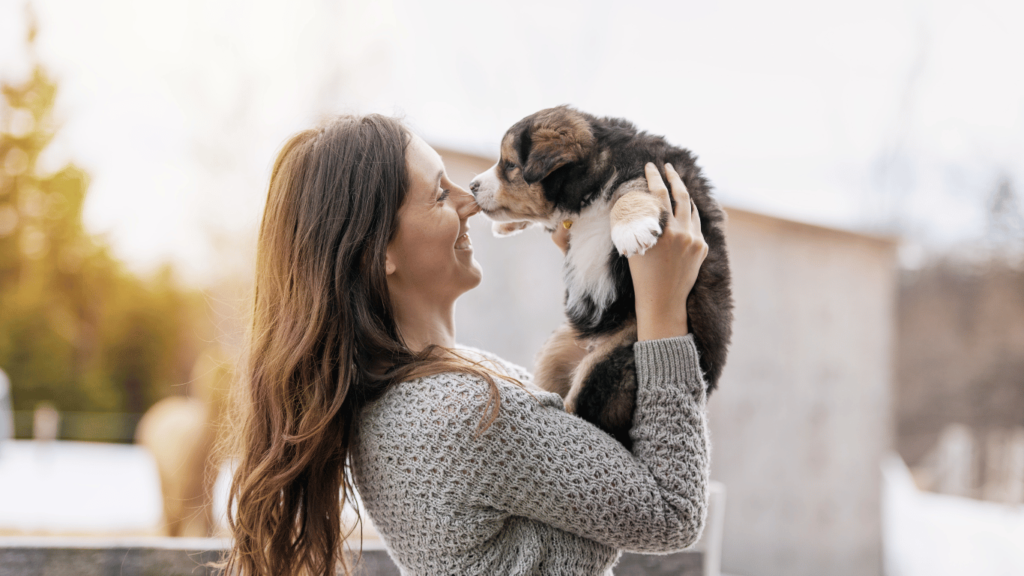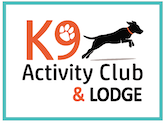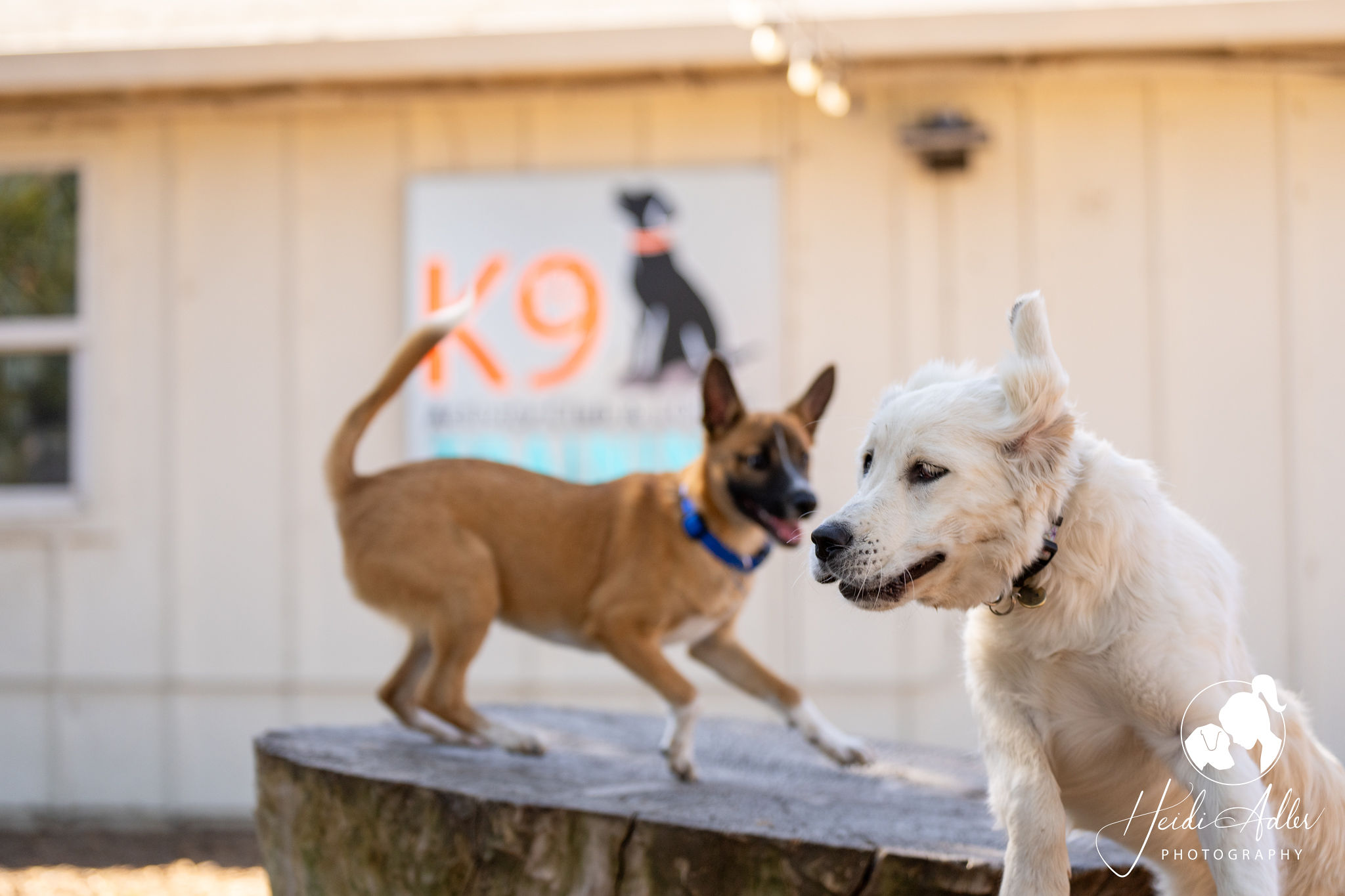Bringing home a new puppy is exciting… and a little overwhelming. From nipping fingers to middle-of-the-night wakeups, there’s a lot to figure out fast. We’re here to answer some of the most common questions new puppy parents ask—and set you and your pup up for success!🦷 1. When Will My Puppy Stop Biting?

🐾 How do I socialize my puppy properly?
Socializing is often misunderstood as simply letting puppies play with other dogs. While dog-to-dog play can be part of socialization, true socialization is much broader and more intentional. It’s about exposing your puppy to a wide variety of sights, sounds, environments, people, and animals in a positive and controlled way, helping them build confidence in the world around them.
For example, socialization might look like:
- Sitting near a shopping center and calmly watching people walk by with carts, strollers, umbrellas, or hats.
- Watching other dogs play at a park from a distance—not necessarily joining in, but observing in a relaxed way.
- Hearing traffic noises, sirens, or skateboards while enjoying treats and praise.
- Walking on different textures like grass, gravel, or metal grates.
- Meeting people of different ages, sizes, and energy levels in short, positive encounters.
The goal of socialization isn’t overstimulation or forcing interaction—it’s creating calm, confident exposure. A well-socialized dog doesn’t need to play with every dog or greet every person; they simply feel safe and comfortable in new situations. The experiences you provide now help shape how your dog will respond to the world for the rest of their life.
So remember: quality socialization > quantity of play. Slow, positive exposure builds resilient, well-rounded dogs.
🦷 When Will My Puppy Stop Biting?
Biting is totally normal for puppies—it’s how they explore the world, relieve teething pain, and play. Most puppies begin to outgrow the intense nipping phase between 4 to 6 months, especially if they’re gently taught what’s okay to chew (and what’s not).
To help:
- Offer plenty of appropriate chew toys (try frozen carrots or puppy-safe teething rings).
- Use calm redirection: if they bite your hands, swap in a toy instead.
- Avoid rough play with hands, which can confuse them.
- If your pup gets too wild, take a brief break from play to let them reset.
With consistency and patience, this phase passes—and you’ll end up with a polite adult dog who knows how to use their mouth gently.
🛏️ Where Should a Puppy Sleep at Night?
The best place for your puppy to sleep is somewhere safe, quiet, and close to you—typically in a crate or playpen in your bedroom.
- It helps them feel secure in a new environment.
- You can hear them if they need a potty break in the night.
- It builds trust and reduces anxiety.
Crates are a fantastic tool when used positively. Start by making the crate cozy with a soft bed or blanket, and let your pup explore it during the day with treats and praise. Never use the crate as punishment—this is their den, not doggy time-out.
Pro tip: Keep bedtime routines calm and predictable, and avoid big meals or water right before bed to reduce nighttime potty trips.
🧠 What’s the First Thing I Should Teach My Puppy?
Before fancy tricks or off-leash recall, the first thing to teach your puppy is their name and how to focus on you.
Teaching your pup to respond to their name builds engagement and lays the groundwork for everything else—walking politely, coming when called, staying safe.
Start simple:
- Say their name in a happy tone.
- The moment they look at you, say “yes!” or give a small treat.
- Repeat often in different rooms or while they’re distracted.
After that, the basics to focus on include:
- Potty training
- Crate training
- Gentle handling
- Sitting politely
- Walking on a loose leash
Think of this stage like preschool—short, fun lessons that build trust and curiosity!
🐶 When Should I Start Training My Puppy?
Right away. Training starts the moment your puppy comes home—whether you mean to or not!
From the first day, your pup is learning:
- What gets them attention
- Where to go potty
- What’s okay to chew
- How to behave around people and other animals
Formal training (like obedience or puppy classes) can begin as early as 8 weeks, but the real magic happens in your daily routine. Use positive reinforcement, consistent routines, and lots of praise for good behavior. Even five-minute sessions of “sit,” “come,” or walking nicely on a leash can make a big impact when practiced daily.
Puppies are adorable, chaotic little sponges. The key is patience, consistency, and love. With a little effort up front, you’ll help your puppy grow into a confident, well-mannered companion for life.
Looking for more help? A structured puppy socialization or training class is a great way to build good habits early. At K9 we offer free puppy socials to all pups under 6 months old. Puppy S.T.A.R. is a great way to jumpstart training! This 6-week course helps you to learn all the tips and tricks about raising a puppy from our professional trainers. This is $300 for the 6 lessons. And remember: no question is too small—your puppy is counting on you to help them thrive! We would love to help you and your puppy thrive with us!

